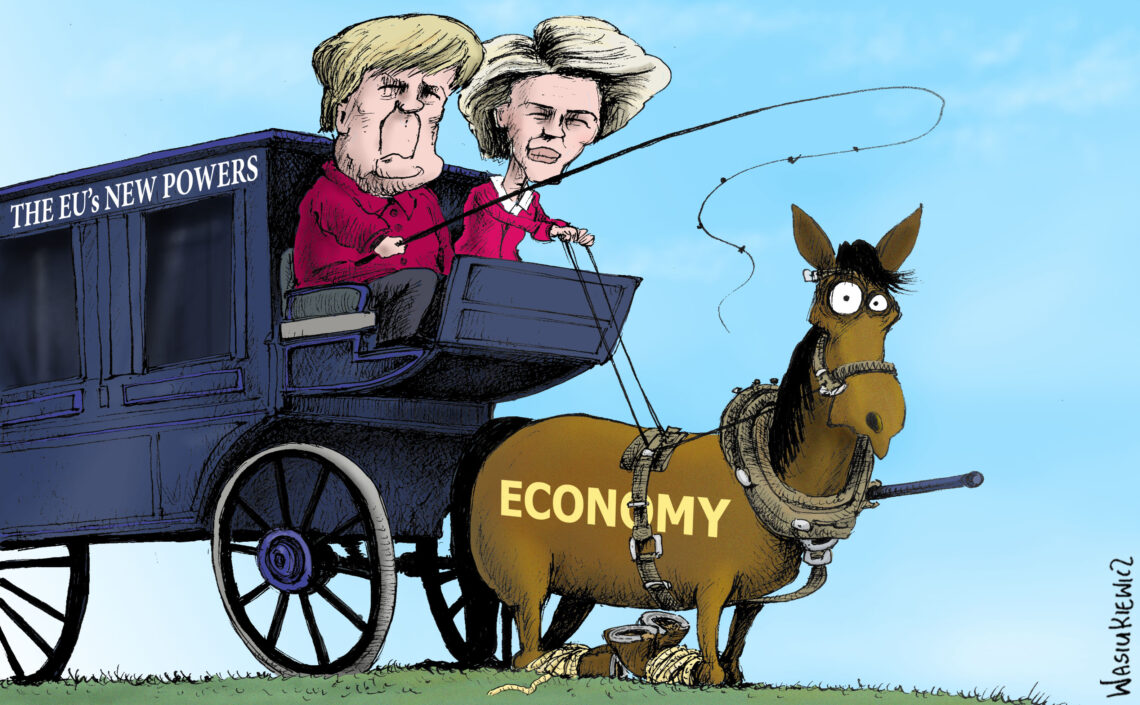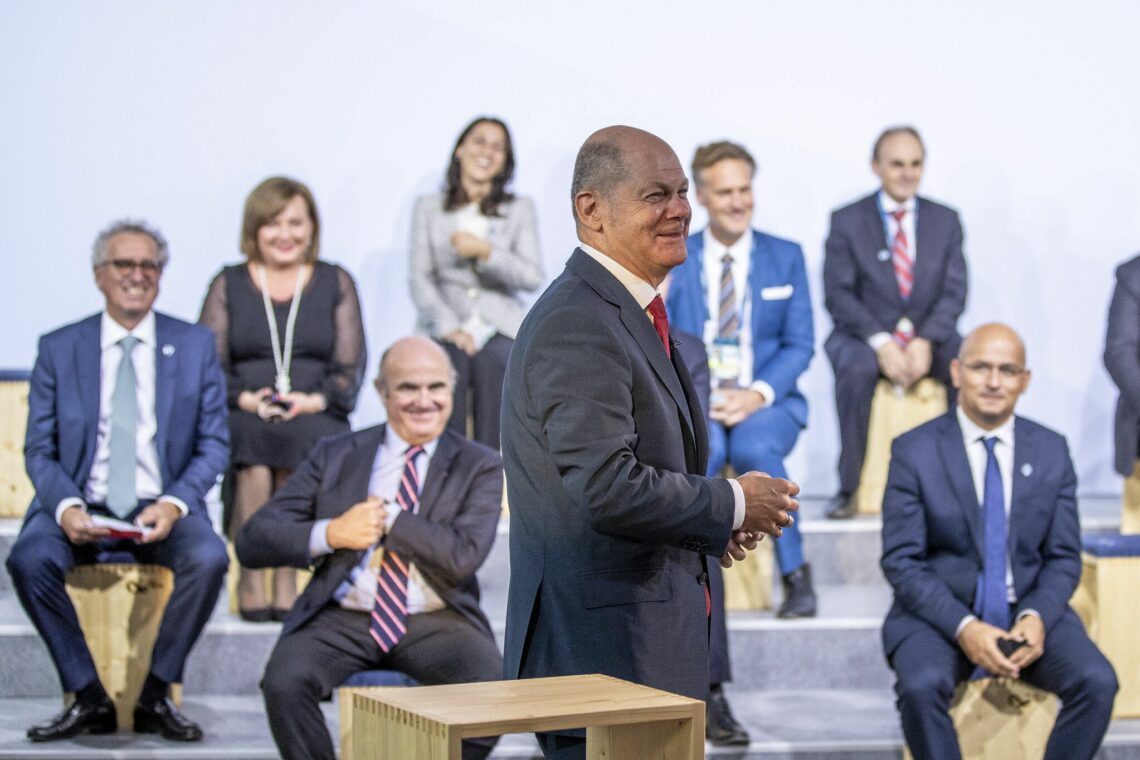The German economic policy agenda for Europe
The German presidency of the EU has a mixed legacy. While the financial packages agreed are a French-German political success, the fiscal consequences of the new measures will raise debt to a vast scale, resulting in economic stagnation similar to the 1970s.

In a nutshell
- Germany’s EU Council presidency has brought mixed results
- German leadership prevented a political disaster
- However, troublesome new fiscal rules were put in place
When Germany took over the presidency of the Council of the EU in July 2020, most European economies were in the midst of the most severe economic crisis since World War II. And what government could be better suited to help the European Union?
The most powerful economy on the continent, Germany came out of the 2008 crisis with record low unemployment, fiscal surpluses and a thriving export sector. In 2020, although the coronavirus initially created an economic shock comparable to that of other EU countries, forecasts show a V-shaped recovery, with most sectors almost reaching precrisis levels early next year. Germany’s leadership, no matter how reluctant, may have been especially welcome for the EU.
Under the motto “Together for Europe’s recovery,” Germany has chosen six “guiding principles” for its Council presidency. It will seek to ensure:
- A permanent end to the COVID-19 pandemic as well as economic recovery
- A stronger and more innovative Europe
- A fair Europe
- A sustainable Europe
- A Europe of security and common values
- A strong Europe in the world
The last five principles have long stood on the EU agenda – goals so vague that they will never be fully attainable. The most immediate and urgent political aim for the German presidency was to make member states agree on the Multiannual Financial Framework (MFF, the EU budget for 2021-2027) worth 1.1 trillion euro and a new “Next Generation EU” (NGEU) fund of 750 billion euro to help member states recover.
With the NGEU, Germany has implicitly enabled the EU Commission to incur debt on an unprecedented scale. German Chancellor Angela Merkel was keen to note that this was a temporary, one-off measure. But many others in the EU (including Finance Minister Olaf Scholz, a Social Democratic candidate for the chancellorship) saw this as a “revolution” leading to permanent collective debt spending and tax raising in Brussels.
This clandestine change of European fiscal rules – which still needs to be approved by parliaments – will likely remain the most salient legacy of the German presidency.
‘More innovative Europe’
It is highly dubious that the fiscal decisions made in June will lead to “a stronger and more innovative Europe.” With the MFF, most of the EU budget will still be spent on subsidies for farmers and regions, whereas funds for research decrease. And the billions paid out of the NGEU are not likely to be spent on innovation, but rather on keeping businesses alive – many of which would have shut down even without the pandemic.
With this new borrowing, taxing and spending authority, the EU may end up mirroring the policy of most nation-states: taxing creators of market-tested value to fund “zombie” businesses and banks. Of course, this will be framed differently, and the guiding principle of “a fair Europe” is meant to ennoble such policies. But the measures will predictably distort competition in the single market, further delaying structural change.
‘Integration from above’
Brussels pays lip service to “strengthening the internal market,” or “to relieve the burden on companies, citizens and administrations” including “cutting bureaucracy at EU level” and reducing “unnecessary compliance costs.” However, far from curbing bureaucracy, the economic program of the German presidency declares that new regulations and institutions are urgently needed.
A ‘level playing field’ is becoming the main ideal in trade policy.
This is in line with a mode of European integration that has been in the making for decades. In the early years of the EU, Germany and other market-oriented member states (like the United Kingdom or the Netherlands) mostly favored “negative integration from below.” This meant abolishing existing barriers to trade and market entry by letting the four market freedoms (for goods, services, people and capital) determine the allocation of resources on the single market. Other states, such as France, favored “positive integration from above” with European legislators determining a “European social model” under common prescriptive norms and regulations (close to those of the French system). This approach entails much more centralization, harmonization and intervention.
‘Level playing field’
The German presidency seems to have fully embraced this philosophy. The new magic phrase is “level playing field.” The paradigm shift from “negative” to “positive” integration can be seen most clearly in competition policy and trade policy. Germany now calls for “a review and modernization of European competition law in order to ensure competition takes place fairly and on a level playing field.”
This means a shift away from lifting competition barriers in favor of defining equal standards within the EU. The German government no longer regards “industrial policy” (where the state picks the winners and protects the losers with taxpayers’ money) as a dirty word – or a French concept. The Ministry of Economic Affairs is urging the EU to “ensure the strategic autonomy of the EU through a dynamic industrial policy,” to “screen foreign direct investment,” and “produce critical goods in Europe to reduce overdependency on third countries.”
European taxpayers should now “facilitate a greater number of basic innovations made in Europe,” the document says. It refers specifically to battery cells, microelectronics and hydrogen. In addition, state-aid rules should be revised to “permit EU member states to pursue an ambitious energy, environment and climate policy.”
A “level playing field” is also becoming the main ideal in trade policy. The EU has deemed this principle a red line in trade negotiations with the UK. The program of the German presidency even states that “open markets and free trade require the existence of a similar policy framework for domestic and foreign market participants (a level playing field).”
For many, this implies that any nation would have to have the same social, political and environmental conditions as other countries before it is allowed to trade. In a surprising move, Ms. Merkel even promised Swedish climate activist Greta Thunberg this summer that she would not sign the “oven-ready” trade agreement with the MERCOSUR states unless Brazil changes its deforestation policy.

‘Sustainable Europe’
To create a “sustainable Europe,” Germany is advocating radical change at the EU level. This summer, EU leaders agreed on asking EU institutions to come up with a plan to increase the bloc’s 2030 emissions reduction goal from 40 percent to up to 55 percent to reach climate neutrality by 2050. Announced by President von der Leyen in her State of the Union address this September, the goal is unsurprising – but the plan to achieve it is unclear.
Germany’s own energy policy ought perhaps not to serve as a blueprint for other European green deals.
Germany’s own energy policy ought perhaps not to serve as a blueprint for other European “green deals.” So far, it has led to sharp increases in energy prices and imports while billions are spent on renewable energy to end domestic nuclear and fossil energy production. The German presidency wants the EU to follow a “market-based, technology-neutral approach,” but at home, the country does the opposite. As usual, even in the absence of a plan, cash is already made available, namely the 17.5 billion euro Just Transition Funds aimed at helping carbon-dependent regions go green.
Scenarios
How will the German presidency be assessed at the end of the year? Its highlight will most likely be the dramatic five-day-long July negotiations that earmarked 1.8 trillion for the MFF and NGEU. From a strictly political standpoint, the agreement can be considered a victory for Chancellor Merkel, and marks the long-awaited restart of the stalled French-German “locomotive” of European integration.
It is unclear whether the billions are going to flow as planned in early 2020. Both national parliaments and the European Parliament will have to ratify the deal. And whether the money will be raised and spent in an economically sensible manner is another open question.
In the EU, success is usually measured in terms of ambitious agreements on common goals. Whether these can be reached by reasonable means is treated as a secondary matter. At the end of the year, the media and observers in Brussels may look back at the six months of the German EU presidency with appreciation, and perhaps some nostalgia.
A major political crisis was avoided, and the EU as a political project has survived yet another economic emergency. An EU without a budget during its most severe economic crisis would have been a political disaster.
However, the German presidency will most likely have failed to help the union become more competitive and prosperous. There are almost no concrete initiatives in key areas such as opening up the single market for services (where Germany itself is among the most protectionist member states), effectively reducing EU red tape or concluding ambitious trade deals (not only with the UK, but also MERCOSUR or the EU-China Investment Agreement).
Germany not only wasted a leadership opportunity. It also gave the EU dangerous powers. The Union can now raise debt and possibly its own taxes, which could lead to an interventionist industrial policy and to burden trade policy under the “level playing field” mantra.
Many in Brussels see this as a promising political achievement. Others see the recipe for a return to the economic Eurosclerosis of the 1970s.








